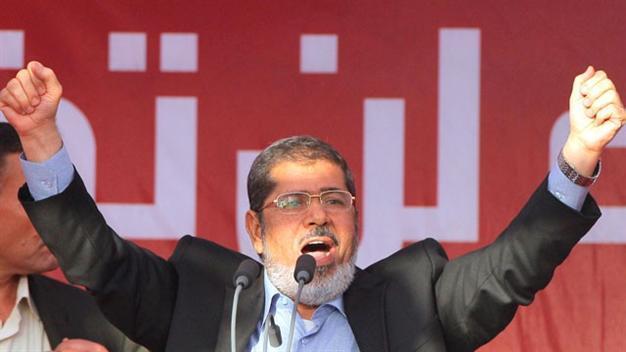Egypt's Morsi in Tahrir tribute before oath
CAIRO - Agence France-Presse

Egypt's President-elect Mohammed Morsi talks to his supporters at Tahrir Square, the focal point of Egyptian uprising, during his speech in Cairo, Egypt, June 29, 2012. AP photo
Egypt's first elected civilian president, Islamist Mohamed Morsi, played up people power ahead of Saturday's actual inauguration by first taking a symbolic oath before a huge throng at Tahrir Square.On the eve of his official swearing-in, Morsi praised Egypt's Muslims and Christians alike Friday in front of crowds that packed the birthplace of the revolt that overthrew his predecessor Hosni Mubarak last year.
The president-elect, who won a run-off vote earlier this month, was received with applause by tens of thousands of people, some of whom had waited from early in the day for his appearance.
He promised a "civilian state" and praised "the square of the revolution, the square of freedom", in what he called an address to "the free world, Arabs, Muslims... the Muslims of Egypt, Christians of Egypt".
Morsi symbolically swore himself in before the crowd, saying: "I swear to preserve the republican system... and to preserve the independence" of Egypt.
"I am one of you. I fear only God," he told them.
Before his triumphant arrival, chants against the ruling military -- which took over on Mubarak's overthrow -- rang out as people gathered under a searing sun.
In his speech Morsi, whose election has raised concerns among Egypt's sizeable Coptic Christian community, served Washington advance warning that his politics will be markedly different from those of his ousted predecessor.
He said he would work to secure freedom for Omar Abdul Rahman, a blind Egyptian cleric jailed for life over the 1993 World Trade Center bombing.
"I will do everything in my power to secure freedom for... detainees, including Sheikh Omar Abdul Rahman," Morsi said.
Abdul Rahman was convicted in 1995 for his role in the World Trade Center attack, plotting to bomb other New York targets including the United Nations, and a plan to assassinate Mubarak.
After taking the oath Saturday, Morsi will have to contend with the Supreme Council of the Armed Forces (SCAF), led by Mubarak's longtime defence minister Field Marshal Hussein Tantawi, which will retain broad powers after the formal handover.
The liberal Wafd newspaper reported that Tantawi will remain defence minister in the new government.
But a defiant Morsi threw down the gauntlet to the SCAF, while addressing the people directly.
"You are the source of power and legitimacy... there is no place for anyone or any institution... above this will," he told them. "I renounce none of the prerogatives of president."
Differences over transfer
The presidency has announced that Morsi will be sworn in Saturday before the Constitutional Court, after differences with the army over the transfer of power.
Morsi "will go at 11 am (0900 GMT) Saturday to the Constitutional Court to take the oath before the Court's general assembly," said a statement released by state news agency MENA.
Traditionally the president takes the oath in parliament, but Egypt's top court has ordered the disbanding of the Islamist-dominated legislature.
The military subsequently assumed legislative powers and also formed a powerful national security council headed by the president but dominated by generals.
By agreeing to be sworn in by the Constitutional Court, Morsi is effectively acknowledging the court's decision to dissolve parliament.
The SCAF also reserves the right to appoint a new constituent assembly should the one elected by parliament be disbanded by a court decision expected on September 1.
The Muslim Brotherhood, from which Morsi resigned after winning the presidency, insists that only parliament can appoint the assembly.
Media reports said Morsi was consulting a cross-section of Egyptian society before appointing a premier and a cabinet mostly made up of technocrats.
In a meeting with Egyptian newspaper editors reported by most dailies on Friday, Morsi pledged there would be "no Islamisation of state institutions" during his presidency.
Morsi has already met Tantawi, as well as a delegation from the Sunni body Al-Azhar, and another representing Egypt's Coptic church.
International Monetary Fund chief Christine Lagarde has told Morsi that the lender was ready to help Cairo, an IMF spokeswoman said Friday.
Lagarde "reiterated that the IMF stands ready to support Egypt and looks forward to working closely with the authorities", the spokeswoman said.
Since late last year the IMF has been discussing a possible $3.2 billion loan with the country's interim leadership to help Cairo bridge fiscal shortfalls while restructuring the economy and financial system.
















